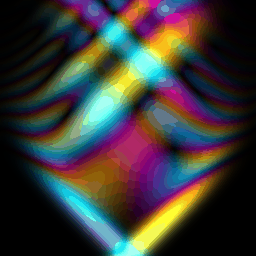You have made your own library for Geometric Algebra in Python. What was the reason behind that?
About a year ago I quit my job and I was looking for something through my full-time hobby. Geometric Algebra has always been something on my mind ever since I attended some of Steven’s talks. I’ve always wanted to take it into a different direction, compared to other people, with more performance-oriented libraries. This is crucial for the types of applications I imagined using Geometric Algebra. Think about robotics simulations, where performance aspects are not neglectable by any means. I created this library as a part of my own learning experience (to get “back into the game”) and because of my practical needs that still needed to be filled.
Have you ever thought about making such a library that aims specifically at the game industry?
I guess the answer is no, and the main reason is because of the environment I have chosen to work in, which is Python. All the machine learning is situated there nowadays, which is great for me since that’s exactly what interests me. Besides that, there is a small amount of game development present in Python, but I am sure that there are a lot of interesting things happening when it comes to the game industry in terms of more well-developed libraries.


Is there anything new that Geometric Algebra made possible by your experience?
Absolutely, the talk about multi-dimensional waves that I gave today was based around that. It has been an itch for a long time, and it was certainly enabled by Geometric Algebra. I have been trying to do this for 15 years and I couldn’t get it to work until I got into Geometric Algebra. I started reading what other people had to say about it, did my own research and all of the sudden the pieces of that puzzle fell in place.
Do you expect Geometric Algebra from now on to grow and if so, approximately how fast?
I think it might even grow exponentially, since I’m confident that 100 years from now on Geometric Algebra will just be a first-year course in the universities, but I thought the same thing 15 years ago when I bought Leo Dorst’s book about Geometric Algebra. I found it fantastic and tried to get my colleagues to read it, but they always found an excuse. I told them that there must be other universities doing it, teaching Geometric Algebra in the first year and stuff like that. I spoke with Leo about it since he’s been a professor at the University of Amsterdam for a better part of his career. I was expecting him to at least teach advanced classes in Geometric Algebra, but apparently that was not the case since that was not what the university expected from him.
The curriculum is pretty much set from top-down which makes it difficult for teachers with their own interests to teach stuff other than what they’re supposed to. I think the most powerful thing is the students learning Geometric Algebra themselves considering the amount of material available publicly. If that same amount of information was out there when I was trying to program games as a teenager, I would have just come to a university and start making fun of the professor by asking him why he’s talking about something that I can do in 3 lines of code. I believe that that type of pressure will drive change. Although that’s not always necessary, since Howest University of Applied Science & Arts (Belgium) is working on implementing Geometric Algebra in the curriculum out of teacher’s interest, which is great.